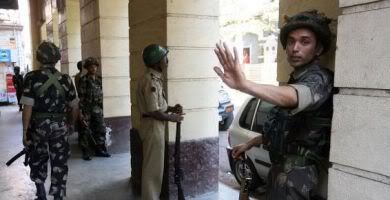11/26 Horror In Mumbai To Ripple Across World?
The city of Mumbai is India's financial capital. India's New York City.
From Magnifico in his Four at Four at Docudharma today:
The Guardian reports Terrorist gunmen are holed up in Mumbai hotels. "About 10 to 12 gunmen remain holed up with hostages inside two Mumbai hotels and a Jewish centre, a top Indian general said today. Major General RK Huda told New Delhi Television that the rest of the gunmen appeared to have been killed or captured." 125 people have been killed and more than 325 wounded.

Mumbai (Marathi: ?????, Mumba?, IPA:[?mumb?i] (help·info)), formerly Bombay, is the capital of the Indian state of Maharashtra and the financial capital of India. With an estimated population of 20 million, it is one of the most populous cities in the world. Along with the neighbouring suburbs of Navi Mumbai and Thane, it forms, at 19 million, the world's fifth most populous metropolitan area. Mumbai lies on the west coast of India and has a deep natural harbour. Mumbai's port handles over half of India's maritime cargo.
Mumbai is the commercial and entertainment centre of India, generating 5% of India's GDP and accounting for 25% of industrial output, 40% of maritime trade, and 70% of capital transactions to India's economy. Mumbai is one of the world's top ten centres of commerce by global financial flow, home to important financial institutions such as the Reserve Bank of India, the Bombay Stock Exchange, the National Stock Exchange of India and the corporate headquarters of many Indian companies and numerous multinational corporations. The city also houses India's hindi film and television industry, known as Bollywood. Mumbai's business opportunities, as well as its high standard of living, attract migrants from all over India and, in turn, make the city a potpourri of many communities and cultures. --wikipedia
 Indian army personnel taking position at Mumbai’s Taj Mahal hotel on Nov. 2 |
Commandos are fighting to clear the last gunmen from two luxury hotels in Mumbai, more than 24 hours after a series of attacks across the city.George Friedman's STRATFOR (Strategic Forecasting, Inc.) has produced an early tentative analysis of possible geopolitical repercussions from the attacks in Mumbai.
The Taj Mahal hotel was nearly free of gunmen, officials said, but operations continued at the Oberoi-Trident hotel.
At a third stand-off, at a Jewish centre, seven hostages were freed, a security official said.
Indian PM Manmohan Singh vowed to track down the attackers, who have killed at least 119 people and injured 300.
Gunmen targeted at least seven sites in Mumbai late on Wednesday, opening fire indiscriminately on crowds at a major railway station, the two hotels, the Jewish centre and a cafe frequented by foreigners.
Let's hope that STRATFOR is not as on the mark with this analysis as they usually are:
 A fire in the dome of the Taj Hotel in Mumbai on Nov. 26 |
Stratfor, November 27, 2008
NOTE: As Stratfor is a paid subscription site, some of the links in this article may lead to a subscriber wall, while some will be Open Access.
SummaryUpdate from Stratfor: India: The Need to React (Open Access)
If the Nov. 26 attacks in Mumbai were carried out by Islamist militants as it appears, the Indian government will have little choice, politically speaking, but to blame them on Pakistan. That will in turn spark a crisis between the two nuclear rivals that will draw the United States into the fray.
Analysis
At this point the situation on the ground in Mumbai remains unclear following the militant attacks of Nov. 26. But in order to understand the geopolitical significance of what is going on, it is necessary to begin looking beyond this event at what will follow. Though the situation is still in motion, the likely consequences of the attack are less murky.
We will begin by assuming that the attackers are Islamist militant groups operating in India, possibly with some level of outside support from Pakistan. We can also see quite clearly that this was a carefully planned, well-executed attack.
Given this, the Indian government has two choices. First, it can simply say that the perpetrators are a domestic group. In that case, it will be held accountable for a failure of enormous proportions in security and law enforcement. It will be charged with being unable to protect the public. On the other hand, it can link the attack to an outside power: Pakistan. In that case it can hold a nation-state responsible for the attack, and can use the crisis atmosphere to strengthen the government’s internal position by invoking nationalism. Politically this is a much preferable outcome for the Indian government, and so it is the most likely course of action. This is not to say that there are no outside powers involved — simply that, regardless of the ground truth, the Indian government will claim there were.
That, in turn, will plunge India and Pakistan into the worst crisis they have had since 2002. If the Pakistanis are understood to be responsible for the attack, then the Indians must hold them responsible, and that means they will have to take action in retaliation — otherwise, the Indian government’s domestic credibility will plunge. The shape of the crisis, then, will consist of demands that the Pakistanis take immediate steps to suppress Islamist radicals across the board, but particularly in Kashmir. New Delhi will demand that this action be immediate and public. This demand will come parallel to U.S. demands for the same actions, and threats by incoming U.S. President Barack Obama to force greater cooperation from Pakistan.
If that happens, Pakistan will find itself in a nutcracker. On the one side, the Indians will be threatening action — deliberately vague but menacing — along with the Americans. This will be even more intense if it turns out, as currently seems likely, that Americans and Europeans were being held hostage (or worse) in the two hotels that were attacked. If the attacks are traced to Pakistan, American demands will escalate well in advance of inauguration day.
There is a precedent for this. In 2002 there was an attack on the Indian parliament in Mumbai by Islamist militants linked to Pakistan. A near-nuclear confrontation took place between India and Pakistan, in which the United States brokered a stand-down in return for intensified Pakistani pressure on the Islamists. The crisis helped redefine the Pakistani position on Islamist radicals in Pakistan.
In the current iteration, the demands will be even more intense. The Indians and Americans will have a joint interest in forcing the Pakistani government to act decisively and immediately. The Pakistani government has warned that such pressure could destabilize Pakistan.
The Indians will not be in a position to moderate their position, and the Americans will see the situation as an opportunity to extract major concessions. Thus the crisis will directly intersect U.S. and NATO operations in Afghanistan.
It is not clear the degree to which the Pakistani government can control the situation. But the Indians will have no choice but to be assertive, and the United States will move along the same line. Whether it is the current government in India that reacts, or one that succeeds doesn’t matter. Either way, India is under enormous pressure to respond. Therefore the events point to a serious crisis not simply between Pakistan and India, but within Pakistan as well, with the government caught between foreign powers and domestic realities. Given the circumstances, massive destabilization is possible — never a good thing with a nuclear power.
This is thinking far ahead of the curve, and is based on an assumption of the truth of something we don’t know for certain yet, which is that the attackers were Muslims and that the Pakistanis will not be able to demonstrate categorically that they weren’t involved.
Since we suspect they were Muslims, and since we doubt the Pakistanis can be categorical and convincing enough to thwart Indian demands, we suspect that we will be deep into a crisis within the next few days, very shortly after the situation on the ground clarifies itself.
November 27, 2008 | 0226 GMT
A massive and well-organized attack by militants in Mumbai, India, has left nearly 100 people dead so far, promises to cut deeply into India's foreign investment prospects and threatens to rock India's government. As India responds to the attack, its relationship with Pakistan will be front and center, and the potential for a destabilization of relations between the two geopolitical rivals is high.
Analysis
It has been seven hours since AK-47-toting gunmen started shooting up five-star hotels in a cosmopolitan district of Mumbai, India. This has now evolved into an attack where the lives of high-value targets, whether they be diplomats or Western corporate executives, are being threatened. With general elections nearing and a global economic crisis in full effect, this is a nightmare situation for India's already weak and fractured government as it attempts to hold onto the Western investment that has fueled the country's growth for more than a decade. For the more immediate future, however, this attack has the potential to spin up into a crisis of geopolitical proportions along the Indo-Pakistani border.
There's more: "11/26 Horror In Mumbai To Ripple Across World?" >>








 In Baghdad as I write this it is early Thursday evening, about 7:00 pm Thursday November 27, 2008. Add 8 hours to current US eastern standard time to calculate Baghdad time.
In Baghdad as I write this it is early Thursday evening, about 7:00 pm Thursday November 27, 2008. Add 8 hours to current US eastern standard time to calculate Baghdad time. 





